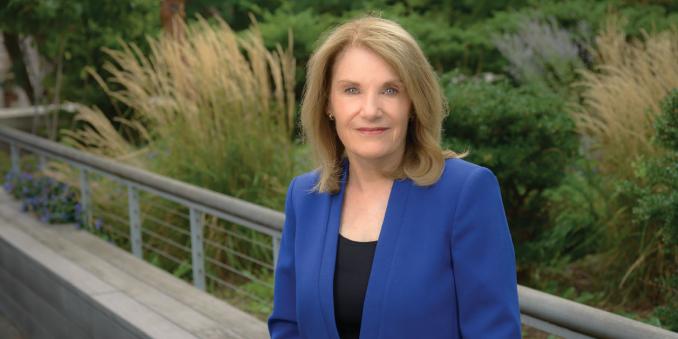Retiring after nearly 45 years on the Mandel School faculty and almost 35 leading the Poverty Center, Claudia Coulton’s career has centered on using data to make community change
When Claudia Coulton, PhD (GRS ’78, social welfare), delivered a major presentation on the potential impacts of welfare reform in Cleveland in 1996, she came prepared with four overhead projector transparencies—and a wealth of knowledge gleaned from data-driven studies.
Facing a room of politicians, reporters, human-services professionals and volunteers for the Federation for Community Planning seminar, she overlaid transparencies of maps and data points to display the spatial mismatch between where poor Clevelanders—especially those who are Black—live, and where jobs are located. In turn, she identified the barriers that kept poor individuals in those neighborhoods.
More than 25 years later, what Coulton demonstrated is now commonly known as systemic racism. And though it took time for the term to come into the national lexicon, this presentation, among many others Coulton has given across her career, brought to light the myriad, deep-rooted issues facing poor Americans.
Coulton started her PhD in social welfare at Case Western Reserve in the mid-1970s, fueled by an overwhelming desire to fix both the injustices rampant in society and the underuse of data in social work.
Within six years of earning her doctorate, she became a full professor. Four years later, she launched the Center on Urban Poverty and Community Development—an organization that today harnesses big data to help reduce lead paint risks, raise awareness of child maltreatment, and influence social policy and practice around the globe. This spring, she retires from the university, but will continue to serve the center as a consultant.
“Professor Claudia Coulton is a national and international luminary in social work, social welfare and beyond,” said Dexter Voisin, PhD, the Jack, Joseph and Morton Mandel Dean in Applied Social Sciences. “She has set the standard for what many scholars hope to achieve during their careers, and the impact of her scholarship will leave an enduring professional legacy.”
In her early career, Coulton’s passion for “crunching numbers” led to positions on the National Association of Social Workers’ team developing national quality assurance parameters for use in healthcare and on a six-city, data-driven Rockefeller Foundation study examining persistent urban poverty—a project that spurred the launch of the Mandel School’s Poverty Center in 1988.
Coulton’s more than 200 peer-reviewed articles, book chapters, papers and reports—on everything from lead poisoning to the foreclosure crisis—place her among the top 2% of most-cited academic researchers in any field, according to a Stanford University/Elsevier global list. Her accomplishments in her field and at Case Western Reserve, including chairing the Mandel School’s doctoral program and helping guide curriculum transformations, earned her the university’s highest honor: Distinguished University Professor. She was among the first six people nominated to the American Academy of Social Work and Social Welfare. And, in 2019, the National Association of Social Workers named Coulton a “Social Work Pioneer.”
“Some people call what we do at the Poverty Center ‘bringing truth to power,’” Coulton said. “Throughout my career, that’s what I’ve tried—and will continue to try— to do: use technology, data and visualizations to move the needle on the thinking and make a real impact in our communities.”
By Emily Mayock
Read more stories like this in the Spring 2022 edition of Action.


